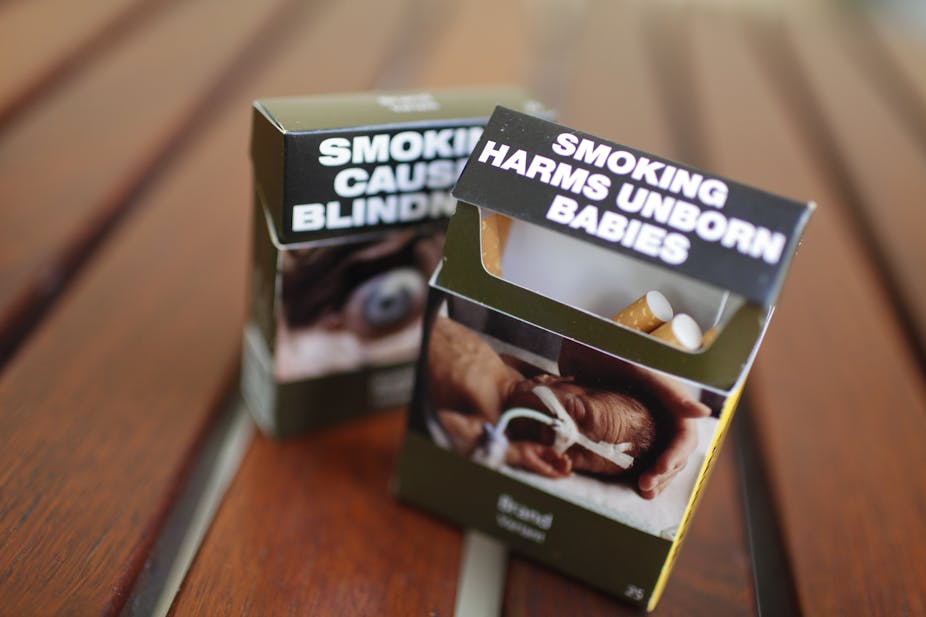Earlier this month, Cuba became the fourth country to challenge Australia’s plain tobacco packaging law by requesting consultations with Australia through the World Trade Organization (WTO).
Tobacco companies can’t bring claims directly in the WTO, but the industry has stated publicly that it is helping countries bring these claims.
International significance of plain packaging
According to the World Health Organization (WHO), “[t]obacco kills nearly 6 million people each year”, and global tobacco consumption is increasing.
In international terms, the Australian market for tobacco products is tiny, with its population of 23 million and a smoking rate of around 16%. But if other countries follow Australia’s lead in requiring standardised packaging as part of a comprehensive strategy of tobacco control, it will hurt the industry’s bottom line. Tobacco companies are rightly concerned, which explains their aggressive response to the Australian law.
The industry has already suffered major setbacks in its campaign against plain tobacco packaging.
In 2012, the Australian government successfully defended claims under constitutional law brought by the multinational tobacco companies British American Tobacco, Imperial Tobacco, Japan Tobacco and Philip Morris in the High Court of Australia.
More recently, New Zealand announced its eventual aim of introducing similar laws.
A question of development or profits?
In taking the first step towards a legal dispute against Australia at the WTO, Cuba joins Ukraine, the Dominican Republic and Honduras.
A few days ago, a Swiss public relations company issued a press release on behalf of the Dominican Republic, stating:
We welcome Cuba’s decision to join the list of developing countries that are fighting for the livelihoods of hundreds of thousands of tobacco workers.
The idea that tobacco control is a developed country tactic opposed by developing countries is ludicrous. The burden of tobacco-related death and disease falls disproportionately on the developing world and on the poorest people of countries worldwide, and the profound negative impact of tobacco on social and economic development is universally recognised.
The WHO Framework Convention on Tobacco Control (WHO FCTC) has 176 parties (including Australia, Honduras and Ukraine) and covers 88% of the people of the world. Developing countries from Africa, Asia, Latin America, the Middle East and the Pacific have championed the high standards set by the treaty and its guidelines.
So the underlying interests fighting Australia’s plain packaging law are not developing countries, farmers or workers but the global tobacco industry. Tobacco companies have brought direct and indirect claims against Australia in every tribunal possible, beginning with the High Court case already mentioned.
Philip Morris Asia Limited has brought an investment claim against Australia under the Hong Kong - Australia Bilateral Investment Treaty. Philip Morris is also pursuing an investment claim against Uruguay, a developing country that is at the forefront of international efforts to combat tobacco.
Domestic litigation by tobacco companies also continues in developed and developing countries around the world in relation to various tobacco control laws, including graphic warnings in the United States.
And what is the industry’s connection to Cuba? The Cuban monopoly that exports Cuban cigars and other tobacco products, Habanos SA, is half owned by a subsidiary of Imperial Tobacco.
Likely outcomes at the WTO
Australia has strong grounds to win the WTO dispute.
All four countries’ complaints concern the impact of the Australian law on intellectual property (such as tobacco trade marks) and imported products (cigarettes and cigars).
But the law applies equally to all tobacco products from all countries, including Australia and New Zealand. The law is also based on years of research showing that standardised packaging will reduce the appeal of tobacco products and enhance the effectiveness of health warnings. Finally, the law implements Australia’s obligations under the WHO FCTC. All these factors enhance Australia’s position in the WTO dispute.
If it proceeds, Cuba’s complaint is likely to be heard alongside those of the other three countries by a single panel of three people. Panel proceedings usually take around a year and are often followed by an appeal lasting several more months.
If Australia did lose the WTO dispute, it would not be required to pay any financial compensation. Instead, it would have time to change its plain packaging laws to accord with WTO rules.
For the industry, whether Australia wins or loses, supporting the WTO challenge is simply part of its long-standing strategy of delaying and hindering tobacco control regulations wherever possible.

